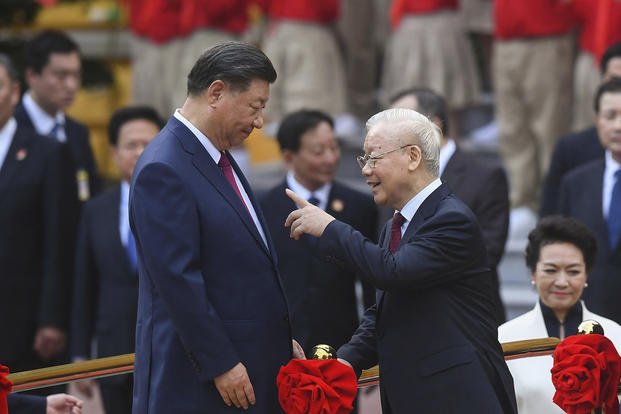BANGKOK — Chinese leader Xi Jinping arrived in Vietnam on Tuesday seeking to deepen ties with the Southeast Asian neighbor, weeks after it elevated its diplomatic relations with the United States and Japan.
At the meeting with Vietnam's Communist Party General Secretary Nguyen Phu Trong, Xi announced that the countries would work together to create a “China-Vietnam community with a shared future of strategic significance."
Vietnam has resisted using that phrase in the past, but Beijing is seeking reassurance from its ally after Vietnam designated both the U.S. and Japan as “comprehensive strategic partners," the designation it uses for China. It is the country's highest official designation for a diplomatic relationship.
"These symbolic gestures go a long way to reassure Beijing that Vietnam still sees China as its most important partner," said Hunter Marston, a PhD candidate at the Australian National University who studies Southeast Asia's foreign policy.
Xi’s visit marks 15 years of China being a “comprehensive strategic partner” of Vietnam. But that designation is now being given to other countries as Vietnam seeks to keep itself from being overly reliant on Beijing.
In September, U.S. President Joe Biden visited Vietnam to mark the U.S. being elevated to the same diplomatic status as China. Biden asserted that the stronger ties were not about countering China, though U.S. diplomacy across Asia and the Pacific has been focused on improving defense ties with countries to do just that.
In November, Japan and Vietnam boosted their economic and security ties, citing a “free and open Indo-Pacific." Japan has been rapidly developing closer ties with Vietnam and is its third-largest foreign investor.
Given the latest developments, experts say Vietnam wanted to make a concession to Beijing, though only at the level of rhetoric.
“I think following the signing of the Comprehensive Strategic Partnership during Biden’s last visit, there must be something done to mollify the Chinese concerns,” said Collin Koh, a regional security expert at Nanyang Technological University in Singapore.
"Community with a shared future” is a term that Xi put forth a decade ago. While it does not denote a specific initiative, some experts say it has a lot of underlying significance.
“It's somehow another term for alliance,” said Nguyen Thanh Trung, a professor of Vietnamese studies at Fulbright University Vietnam. “For example, Vietnam has to support China in multilateral forums, and it carries a lot of weight.”
Ideologically, Vietnam is close to Beijing. It is run by a Communist Party with strong ties to China. But in recent months, Vietnam has signaled closer ties with Western countries.
Vietnam is also one of several countries to clash with China in the disputed South China Sea, particularly on two archipelagos, the Spratlys and the Paracel Islands. It has faced off with China’s coast guard in the disputed waters. Vietnam usually does not publicize the confrontations.
Vietnam is likely to sign some infrastructure agreements with Beijing, as it has paid close attention to the development of the Chinese-built high-speed rail in Laos, completed in 2021.
“The Vietnamese prime minister wants to focus on more infrastructure,” said Nguyen, the professor. “He thinks it’s key to economic growth.”
Xi will meet with President Vo Van Thuong and Prime Minister Chinh on Wednesday.
China has been Vietnam’s largest trading partner for several years, with a bilateral trade turnover of $175.6 billion in 2022. Imports from China, including crucial inputs for Vietnam's manufacturing sector, make up 67%, according to Vietnam customs data cited by Vietnamese state media.
However, the trade is at a deficit in China's favor.
China has over $26 billion invested in Vietnam, with more than 4,000 active projects.
Xi’s 2017 visit to Vietnam was for an Asia-Pacific economic summit in the coastal city of Danang.
Associated Press writer Aniruddha Ghosal and video producer Hau Dinh in Hanoi, Vietnam, contributed to this report.











